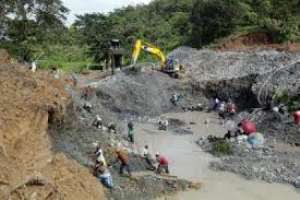
Gold exports from Ghana's smallscale miners in 2012 and 2013 amounted to the same volume of production by the three leading mining firms in the country.
Figures from the Minerals Commission indicate small scale and artisanal mining accounted for 34% of total gold production in Ghana, which amounts to 1.6million ounces of gold.
This is equivalent to the total exports of Anglogold Ashanti Obuasi mine, Goldfields Tarkwa and Newmont Gold Ahafo mine.
The State is however losing its resources without compensatory revenue.
There is no mineral royalty payment on the extraction of gold by the small scale miners – an annual Gh₵500million in taxes and royalties is estimated to have been lost to the artisanal mining.
The Mining and Minerals Act 2006, Act 703 does not differentiate between small scale and large scale operations in terms of royalties and both are liable for royalty payment.
The 2012 and 2013 report of Ghana Extractive Industries Transparency Initiative (GHEITI) has recommended that “the rate at which royalty is paid may be differentiated between large scale and small scale holders” whilst royalty payment may be instituted at the point of export for the small scale operators.
Dr. Steve Manteaw of the Integrated Social Development Centre (ISODEC), a civil society group, says taxing the smallcale miners will demand mainstreaming of their activities.
He observed the failure of the country to make formalization of illegal mining attractive to galamsey operators.
“When multinational mining companies come into the country, we bend over to give them incentives and whatever support they need to be successful; their success become of paramount interest to the State. Why shouldn't the success of smallscale miners be of paramount interest to the state?” he quizzed.
According to him, players in the informal mining sector can be incentivized with support mechanisms, including access to geological data, technical aid - in which a plant pool of equipment can be accessed at subsidized rate.
“If I know that by formalizing my activities I get some support in terms of being able to access venture capital fund to finance my operations, then it becomes attractive to move away from illegal activities into the formal sector; once you've done that then we can identify these groups and tax them appropriately to finance national development,” suggested Dr. Manteaw.
Story by Kofi Adu Domfeh




 NDC demands complete overhaul of security protocols at EC to safeguard electoral...
NDC demands complete overhaul of security protocols at EC to safeguard electoral...
 Ghana reaches interim deal with international bondholders — Finance Ministry
Ghana reaches interim deal with international bondholders — Finance Ministry
 Mahama to form joint army-police anti-robbery squads to safeguard 24-hour econom...
Mahama to form joint army-police anti-robbery squads to safeguard 24-hour econom...
 Another man jailed eight months over shrinking penis
Another man jailed eight months over shrinking penis
 Ghana to adjust external bond deal to meet IMF debt sustainability goals — Finan...
Ghana to adjust external bond deal to meet IMF debt sustainability goals — Finan...
 IMF negotiations: We've not failed to reach an agreement with bondholders; we’ve...
IMF negotiations: We've not failed to reach an agreement with bondholders; we’ve...
 EC begins recruitment of temporary electoral officials, closes on April 29
EC begins recruitment of temporary electoral officials, closes on April 29
 NPP lost the 2024 elections in 2022 due to inflation and cedi depreciation — Mar...
NPP lost the 2024 elections in 2022 due to inflation and cedi depreciation — Mar...
 Your good heart towards Ghana has changed; don’t behave like Saul - Owusu Bempah...
Your good heart towards Ghana has changed; don’t behave like Saul - Owusu Bempah...
 Wa West: NDC organizes symposium for Vieri Ward Women
Wa West: NDC organizes symposium for Vieri Ward Women
